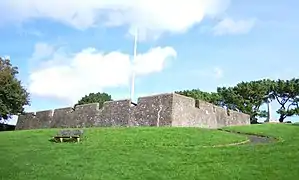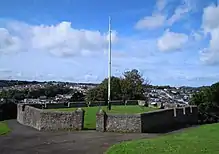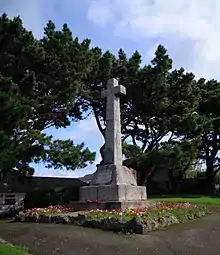Chudleigh Fort
Chudleigh Fort is a fortress in East-the-Water, a suburb of Bideford in Devon in the UK. It was built in about 1642 during the English Civil War. Largely reconstructed in the 19th century, it has been a Grade II listed building since 1949.[1][2]

Civil War period

Because of the prejudice of Charles I against the merchant classes by imposing, for example, a ship money tax, the important mercantile port of Bideford did not support the king during the Civil War, siding instead with Parliament. The important Devon landowner Sir George Chudleigh and his son James Chudleigh, the latter having served as an officer in the Royalist army in Ireland, sided with the Parliamentarian forces based at the garrison in Barnstaple, which also covered nearby Bideford. Some time after August 1642 James Chudleigh built a pair of 8-gun earthwork artillery forts to guard Bideford, strategically positioning them on the high ground overlooking both sides of the River Torridge, one at East-the-Water and the other at West-the-Water,[3] thus preventing the river's use by Royalist ships.
By the Summer of 1643 the Royalists, under Sir Ralph Hopton, had made major gains in the South West, having won victories at the Battle of Braddock Down (January 1643) and Stratton (May 1643), causing the Parliamentary forces to retreat into Bideford where they were then besieged. After more Royalist victories at Lansdown (July 1643) and Roundway Down (July 1643) it became clear that Bideford would not be relieved and in August 1643 it was stormed by Royalist forces under Colonel Digby. Following fierce fighting around the two forts the town fell. James Chudleigh was not in Bideford during the siege having been captured during the fighting at Stratton and imprisoned at Oxford. After his incarceration he and his father and brother defected to the Royalists.
Modern times

At the end of the Civil War the fort was abandoned but the site was never built on and in the middle of the 19th-century it was rebuilt in stone as a five-sided folly by James Ley from Northam, who gave it 14 gun emplacements instead of the 8 the original fort had. The fort now contains 7 old cannon on wheeled wooden gun-carriages.[1] Ley's fort was never intended to be a genuine fortress because of its thin stone walls and open rear. The plaque on the wall states "Fort erected by Major-General Chudleigh. April 1642". However, this is an error as the Civil War did not start until August 1642. The site was purchased by public subscription in 1921 for use as a public park in memory of those who died in World War I. At this time the war memorial was built, paths were laid out and the park was landscaped and laid to grass. Later the plaques on the war memorial were altered to commemorate the residents of Bideford who were killed or missing in World War I and World War II. The park is maintained by the Torridge District Council.[3]
References
External links
| Wikimedia Commons has media related to Chudleigh Fort. |
